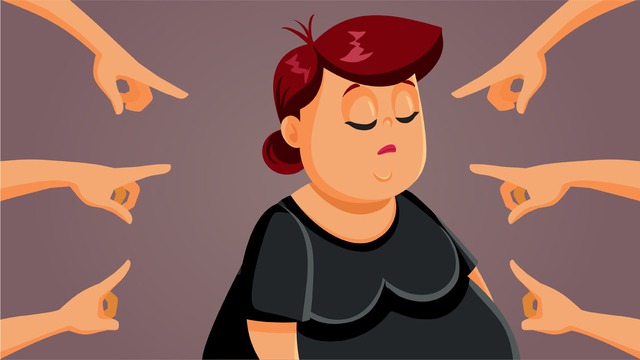Stigma about looks is still “more common” than we think
A few days ago, on the stage of the Oscars 2022, actor Will Smith’s slap to host Chris Rock overshadowed all the remaining developments of the event. This will probably become one of the most regrettable moments in the history of this prestigious film award. The reason is because to create humor for the awards ceremony, MC Chris Rock joked about Will Smith’s wife’s hair loss syndrome image.
Violent behavior of course never gets support. Will Smith could have used another way to protest that Chris Rock made fun of his wife’s appearance. However, this tumultuous incident also reminds us of another sad reality that still exists in the entertainment world and in everyday life, which is crime. Body shaming – body shaming.
According to a survey by the Independent, nearly half of adults have been stigmatized for their appearance. Research in the US also shows that 94% of girls and 64% of boys are victims of stigma about their appearance.

Social media and COVID-19 promote low self-esteem
In addition to verbal actions such as evaluating, judging, and maliciously disparaging someone’s appearance, “appear disparagement” is also a term to refer to self-disparaging thoughts, low self-esteem. into one’s own appearance. This situation is proportional to the development of social networks and increases during the COVID-19 pandemic.

The results of a study in the UK with more than 1,500 young people aged 14-24 showed that regular use of social networks increased feelings of guilt, low self-esteem and self-worry in young people. Many interviewees said that using social networks makes them not sleep well, and is self-conscious about their body appearance when they see pictures posted by others. In particular, the photo-sharing application Instagram is rated as having the most negative impact on this issue.
In addition, during the COVID-19 pandemic, many people have experienced discrimination in their appearance or low self-esteem in the face of news that overweight people with COVID-19 may be in greater danger to their lives. , leading to a wave of harmful diets during the pandemic.
Physical pressure leads to unpredictable consequences
The disparaging words of appearance or the pressure on appearance in society are placing a heavy burden on many people’s shoulders. This can lead to unpredictable consequences, negative mental and physical effects, even life-threatening.
Last month, Korean public opinion was shocked by the news that male volleyball player Kim In-hyeok had committed suicide due to cyberbullying. One of the forms of bullying is disparaging the victim’s appearance, claiming that the victim has put on makeup.

Korean volleyball player committed suicide at home
Olympic medal-winning South Korean archer, An San, was also criticized for keeping her hair short, saying she did it because she wanted to show off her feminism.

An San archer’s short hair is controversial in Korea
Appearance pressure is not a Korean story alone. In China, this condition has caused great damage both physically and mentally, giving rise to eating disorders such as anorexia or bulimia. A study from 2019 found that an estimated 1.5 million Chinese suffer from this condition.
Zhang Qiwen, 23 years old, also fell into the same situation: “At that time, I weighed only 28 pounds and had to be hospitalized for treatment.”.
Challenges on social networks such as the challenge of a small waist the size of an A4 paper have put invisible pressure on many people. It is said that only thin is beautiful, thin is happy. Although these pressures are invisible, their consequences are very clear.
“At that time, I couldn’t even walk anymore. My legs didn’t have strength, my eyes couldn’t see clearly, my hair fell out, my body functions were all messed up.” – shared by Ms. Zhang Qiwen.
After recovering, now loving and taking care of herself is what Ms. Zhang does every day. Ms. Zhang also participated in organizing an exhibition against appearance pressure and disparaging looks.
Efforts to combat the stigma of appearance in the world
And with such awareness, in the world, although there are few clear laws against this problem, many events have been held and many policies have been put in place to limit the stigma of appearance.
In Paris, France, there is an annual week dedicated to raising awareness about discrimination against looks, including activities such as fashion shows for all different body types. Thousands of legal advice phone numbers and helplines have been set up so that people suffering from visual discrimination can seek help.
The UK in 2019 also published a White Paper on Online Harms, which addresses harms associated with the promotion of unrealistic body images online, exacerbating self-image body.
The United States also has a federal law that prohibits discrimination regarding other people’s physical defects that negatively affect their lives.
Instead of spending time thinking and feeling self-conscious about their appearance, experts recommend that each person should find their own beautiful features to feel more confident.

In addition, there are no standards of beauty that can be imposed on others, no one has the right to criticize anyone’s appearance. This is an act that deserves condemnation in the whole society. When faced with this situation, boldly speak up and express your feelings.
* Invite readers to watch the programs broadcast by Vietnam Television on TV Online and VTVGo!
at Blogtuan.info – Source: vtv.vn – Read the original article here



